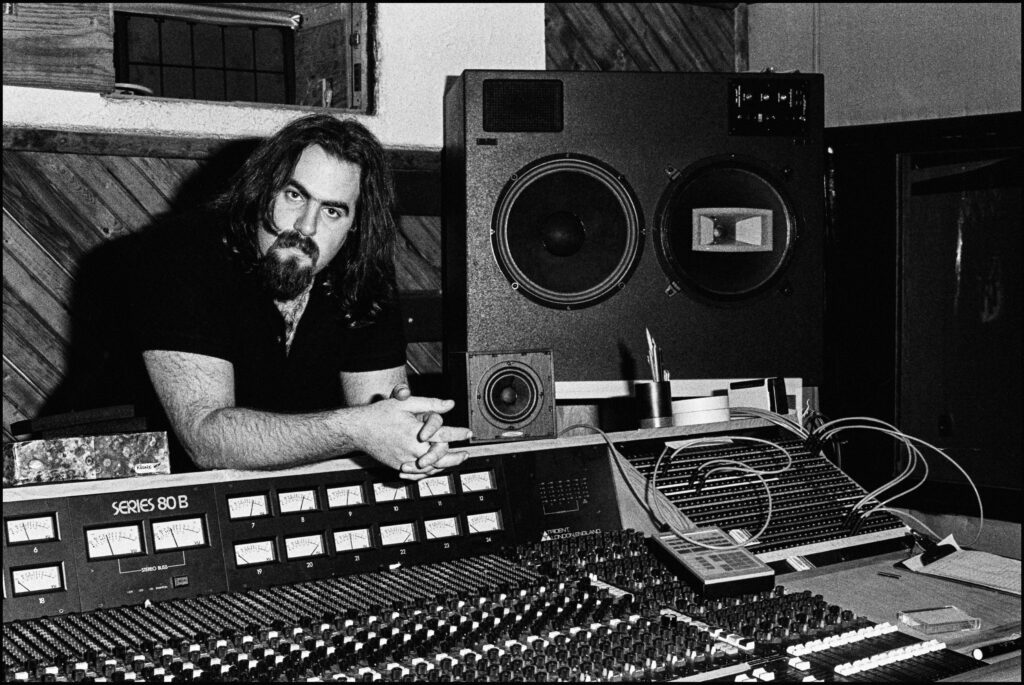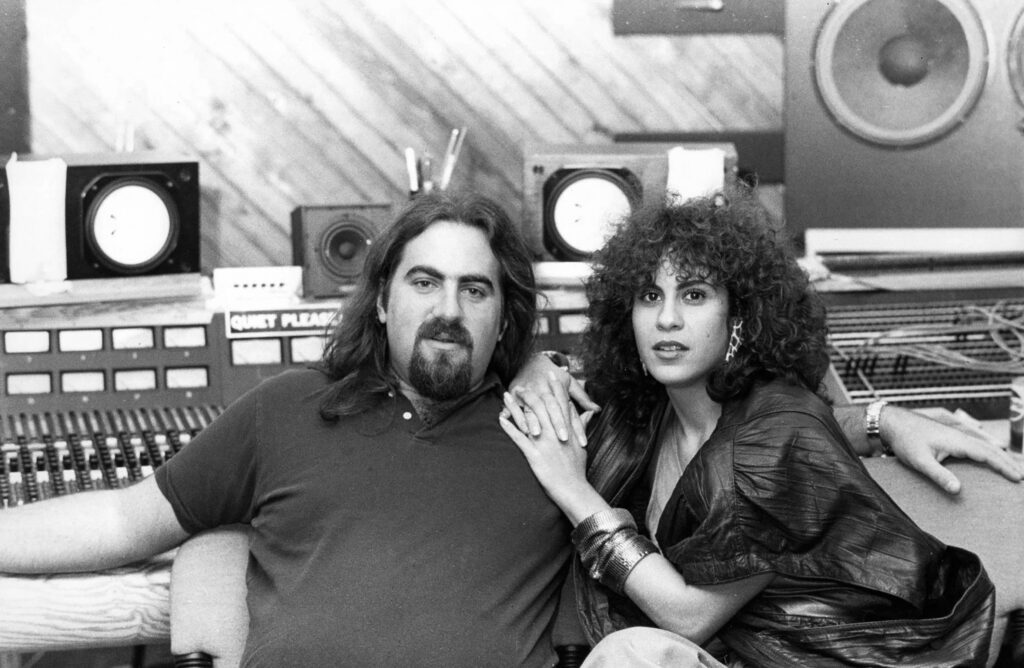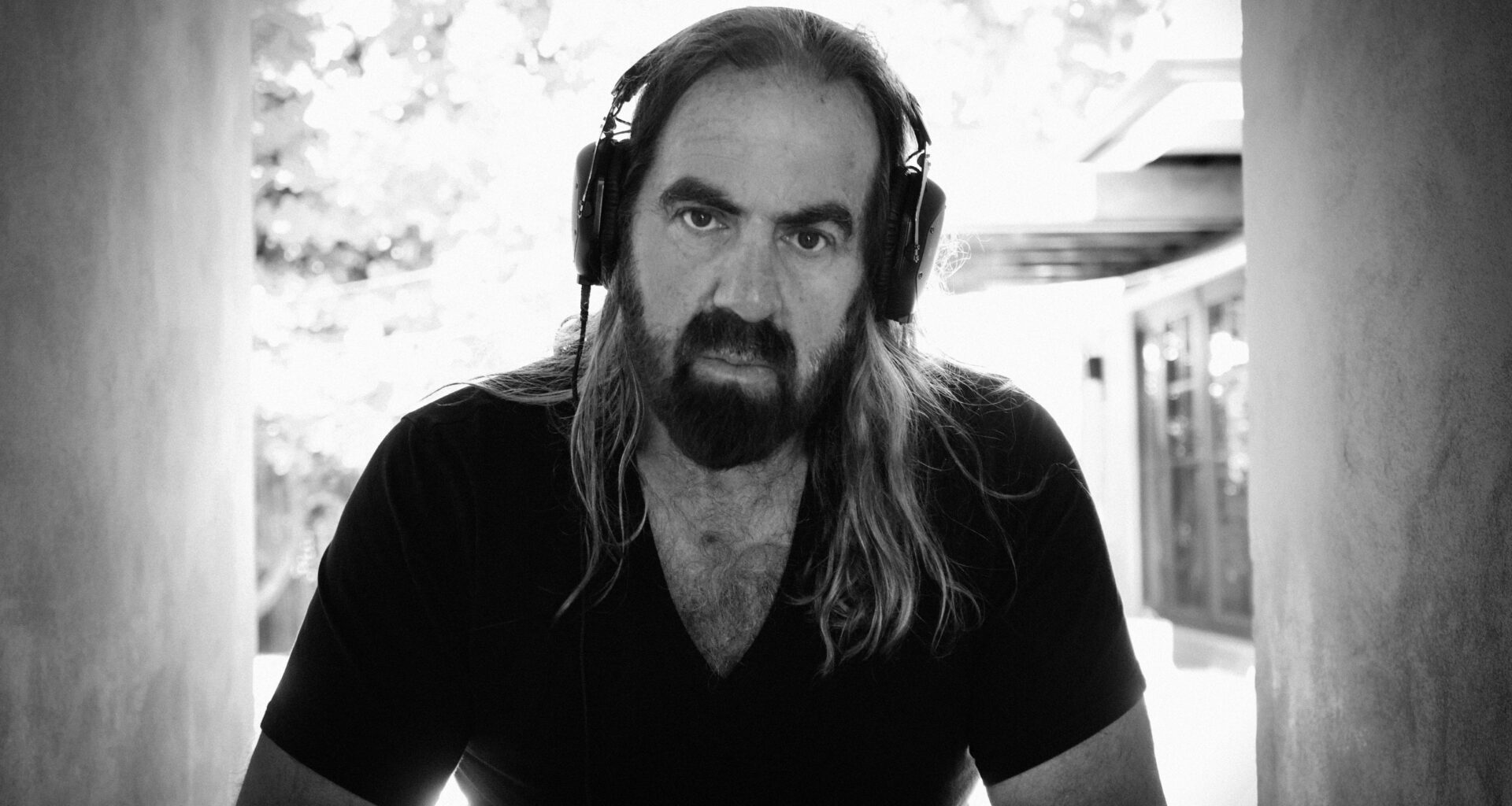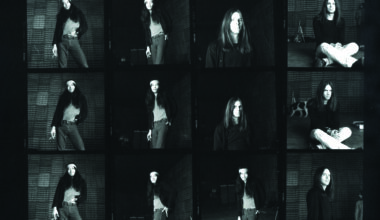Legendary producer Arthur Baker shouldn’t really need any introduction. With a new compilation showcasing his classic 1980s remixes, he reflects on his time working with New Order, the rigours of being a full-on restaurateur, and having his own radio show
In Miami, the air temperature on Arthur Baker’s street is already dangerously close to 32C, despite the lovely shade cast from the oak trees lining the pavement. Baker is running a touch late, but when he does come roaring into view, he’s carrying acres of organic produce and other provisions that I help him take inside before we settle in for a chat.
Even though he is edging closer to his 70s, Baker doesn’t seem to be looking to downshift into an easier gear just yet. Over cups of Cuban-strength black coffee, served graciously by his fashion-designer wife Annette Felder, he stretches out on an oversized chaise longue and confides that he’s getting ready to set sail alongside Richard Branson, leadership guru Simon Sinek and at least one SpaceX VP on one of those floating nation states that Virgin refers to as a cruise ship.
“There’s a club here called Dante’s HiFi and it’s vinyl-only, so they’re doing a pop-up on the ship and they invited me on,” he says, relaxing deeper into the sofa. “And since I can only play vinyl, it would be really nice if I had the compilation because I would have a lot to choose from my old stuff.”
The compilation he’s referring to is called ‘Dance Masters: Arthur Baker – The Classic Dance Remixes’, a whopping 43-track trawl through some of the highlights of his production career. The range of artists is fairly staggering, and he’s even managed to get the green light to release his rework of the Pet Shop Boys’ ‘Suburbia’ single from 1986, which was a promo-only rarity. At the time, he was on quite a professional tear, having delivered successful remixes for everyone from Cyndi Lauper to David Bowie and even Fleetwood Mac.
“Michael Ostin, who was head of A&R at Warner Bros, had been in London when I’d done the Living In A Box mix, which is also on the compilation,” explains Baker. “He’d heard me on the radio with Paula Yates, being really confident when she asked me what I was working on.
“I said, ‘I just did this new group that no one knows about, and it’s going to be a big hit!’. Two weeks or a month later it was a big Top Four in England and my mix was sort of the thing that made it happen. So Michael called me up and said, ‘You know, I just heard that mix and it’s great! I’d love for you to come and meet me in LA’.
“So I went, and Michael played me something and it was Fleetwood Mac’s ‘Big Love’. And he said, ‘Can you do anything with it?’. And I said, ‘Yeah, I totally know what I’m gonna do with it. I hear it from the first 16 bars’.”

The next thing Baker knows, he’s standing inside Lindsey Buckingham’s Los Angeles gaff, where the guitarist hands him a copy of the multitrack he’s made for him.
“He said, ‘Do whatever you want with it’. And then when I did the mix, he was a little upset I’d used Stevie Nicks’ vocal in it, even though it was on the tape he’d given me. He didn’t say not to use it, so I had. So we went back and cut some of it out, and they were happy enough with it that I did the next single.”
Not that there weren’t also some hiccups along the way. Like the time a zonked Mick Jagger rocked up to redo a vocal for his solo single, ‘Just Another Night’.
“He showed up with Fonzie Thornton, who was back-up singer for Luther Vandross – I think he came along with Mick to help him,” explains Baker. “He wasn’t happy with the vocal and thought he could do a better job. But he got stoned, so he was kinda singing out of tune.”
The resulting remix has yet to see an official release.
“At that point, I was on a streak where I never had one turned down. And then I had the John Cougar and the Mick Jagger… but I think it was probably right towards the end of my cocaine days. That could have something to do with it.”
No matter. With a new Sirius XM radio show about to go on air, Baker will be able to play all sorts of tracks that have yet to see the light of day officially. He plans to call the show ‘Baker’s Revenge’, a nod to the huge Rockers Revenge hit he had in 1982 with ‘Walking On Sunshine’, just after he’d become a known quantity for producing Afrika Bambaataa’s ‘Planet Rock’ electro-smash.
Back then, right at the dawn of the Reagan era, Baker was a mainstay at Brooklyn’s Music Factory Records – a small chain shop where, once you had crossed the threshold, you could be quickly clued-in on exactly what sounds were currently driving New York City’s clubland.
“I’d always go and do my research and listen to music there,” he recalls. “There were two clerks/managers/DJs who used to work there… two brothers named Donnie and Dwight Calvin. I respected their opinions. Dwight had played me ‘Numbers’ by Kraftwerk, and that’s sort of how I got the idea for the beat for ‘Planet Rock’. They were cool guys, and we discussed ‘Walking On Sunshine’ because it had been a big record by Eddy Grant a few years earlier, in 1979 or 1980 when it originally came out, and I thought we could do a great version of it.”
Dwight Calvin was quick to agree and even offered up a suggestion for a vocalist.
“Dwight said, ‘Oh yeah, we should do that!’. And I said, ‘Definitely! I know the track, but I need some singers!’. So he said, ‘My brother’s a singer!’.”
The final 12-inch version of ‘Walking On Sunshine’, released on Baker’s own Streetwise label, clocked in at a shade over nine minutes. Kicking off with real congas set against spacey synth bleeps, Donnie Calvin’s vocals call the tribe to the dancefloor with spirited cries of “Hey, hey!”, before his voice gets bathed in echoey layers of delay.
“Eddy’s original wasn’t a traditional song,” says Baker. “It didn’t have a bridge. It was more of a groove with lyrics. And I made that track specifically for Paradise Garage. So when we were mixing it, I was thinking about what would work there and also at the Fun House. We sort of structured a lot of it after the fact when we mixed the record. It was probably one of the last tracks that I did that way.”

But the single went Top 10 in the UK and sailed to the Number One slot on the US Dance Chart as well. Baker’s facility with what worked in the clubs was undeniable, and a tidal wave of work washed over him. The tectonic shift from producer to the notion of remixer-as-artist was suddenly happening, and Baker was among its chief beneficiaries.
“The first real remix I did was ‘Girls Just Want To Have Fun’, and I got paid quite a bit for that. From there, I did Springsteen. Then I went to the UK and did Pet Shop Boys, Fine Young Cannibals, General Public and The Colourfield. That’s when it really all took off.”
And then there’s his work with New Order, of course.
“When I first met them they were very quiet,” remembers Baker. “They thought I was a flash producer and I thought they were a flash band. It was more like I didn’t give them my full attention at first because I was finishing up the Freeez record. So they were just hanging around. Then by the time I could focus on it, we had very little time to work. We’d cut ‘Confusion’ and ‘Thieves Like Us,’ but we didn’t have time to cut the vocal on ‘Thieves Like Us’.
“We finished the recording of ‘Confusion’ and then I mixed it after they left. But with ‘Thieves Like Us’, which came out a few years later, they never told me they’d finished it. So basically, I’m at a club and I think, ‘Wow, that beat sounds really familiar’. And this club had stairs to the DJ booth, so I climbed up and I was like, ‘Can I see the record?’ because I knew the DJ. And it said, ‘New Order, ‘Thieves Like Us’, written by Arthur Baker and New Order’. So I got the writing credit but not the production credit. I recently found some quarter-inch mixes of that song. They’re like working demos, which are great.
“When I was doing the ‘Dance Masters: Shep Pettibone – The Classic Master-Mixes’ boxset, I was trying to get artists who had done the original songs to come and talk about the remixes and how much they liked them. So I talked to Hooky about ‘Bizarre Love Triangle’ and he goes, ‘Oh, I’ll do it, I’ll do it – but I’ll have to say how much I hated the remix’. And I’m like, ‘Wait a minute, why did you hate the remix?’. And Hooky said, ‘He took my fucking bass out! There’s no bass in there!’.”
Even though he continued doing high-profile work, Baker decided to diversify a little and invest in a friend’s restaurant venture. The Elbow Room in Notting Hill was the first of several US-style pool hall burger joints.
“It was a very American concept,” he says. “We opened the first one in Westbourne Grove in Notting Hill, and then we ended up opening five or six others. It was really successful, and then when we opened up in Islington, I did a thing called Sunday Session where I would have bands play. And because it was a bigger venue, we had bands like Mogwai, Elbow, Ash and Alabama 3. They would all come on Sunday and do a set.”
That success eventually spawned Harlem – a trendy West London soul food eatery, where Baker would often feature top-flight DJs such as Armand Van Helden, with the soon-to-be-discovered Diplo playing in the basement room. While it lasted, it became Baker’s all-consuming focus both as owner and performer.
“I used to spin there all the time. And after I had a falling out with my first partner, I was running the place. We would open in the morning for breakfast and I’d be there all day. I lived like a three-minute walk away so I was able to go back and forth. I DJed at night and then I would do the cash-out, so I’d be there from nine to four in the morning. But it was very well-known in the area.”
Baker admits that the 20 years he sunk into being a full-on London restaurateur cost him financially. Yet somehow he was still able to find time to be involved in his wife’s business – the very upscale, earth-friendly fashion house known as Felder Felder. While Annette and her twin sister were dressing the likes of Florence And The Machine, Coco Sumner and Kate Nash, Baker would often supply the sounds of the catwalk.
“The fashion shows were like two-a-year for about eight to 10 years, and I would do bespoke music,” he says. “I’d have people like Peter Hook, Stuart Braithwaite and Trevor Jackson come down to London and make music with me. It was the most stressful thing I ever did because it’s my wife’s fashion show, so you don’t want to fuck up.
“So it would be like the night before… say four in the morning, the show’s at 10 and I’m there working on the music at the venue. Or the show’s in an hour and I’m bouncing it down and making changes and, you know, it was pretty hardcore.”
Much of that music still remains unreleased. Baker is confident he’ll be able to resurrect it for his radio show and perhaps beyond, but it might be a while before those tracks resurface. Currently, he’s 90,000 words or so into the autobiography he’s writing, as well as shepherding the ‘Dance Masters’ compilation series and also being a busy dad.
Plus, he’s not averse to doing the odd remix now and then when it suits him. In 2021, he once again joined forces with his old mates in New Order to put an eight-minute-plus spin on their ‘Be A Rebel’ single. And, more recently, another request from an old friend popped up on his mobile.
“I got a text about three weeks ago from Remi Kabaka from Gorillaz. He goes, ‘Hey man, I’ve got this group I’m working with and they’d love for you to do a remix!’, and I thought, ‘OK, cool’. And I mean, I love Remi, but I hadn’t heard from him in years, so I said, ‘Listen, if I like the track, I’ll do it’. So he sends me the track and the group is called Yard Act. They were fans, so I listen and I like the track, but I don’t know what I’m gonna do with it.”
To Baker, this new cut – ‘The Trench Coat Museum’ – sounds a bit like LCD Soundsystem. But it isn’t until almost the end of the song that he hears what he’s always searching for.
“Right at the end there’s this vocal bit and a bassline before it goes into another thing, and I’m like, ‘OK, I’m gonna use that and I’m going to build the whole track around a little vocal sample’. So I cut it up and I send it to Remi. He loves it and sends it to the group, and they’re freaking out over it.”
Baker is so enthused about it that we adjourn to his bedroom studio, where he stands before a modest pair of monitors as he hits play on his computer. A dubbed-out version of singer James Smith’s voice erupts in the room. As the track builds and the beat takes over, any semblance of the band’s post-punk edge dissipates into a spacey, rave-tastic groove.
Receipts and other bits of paper are being gently blown around the desk as the bass pumps the tiny speaker cones. And for most of the 10 or so minutes we’re immersed in the bumping, psychedelic, driving-way-too-fast-over-to-that-club-by-the-beach-at-night vibe, Arthur Baker is deeply keyed into the sound, zoned out and perhaps not even entirely aware I’m there.
‘Dance Masters: Arthur Baker – The Classic Dance Remixes’ is out on Demon






